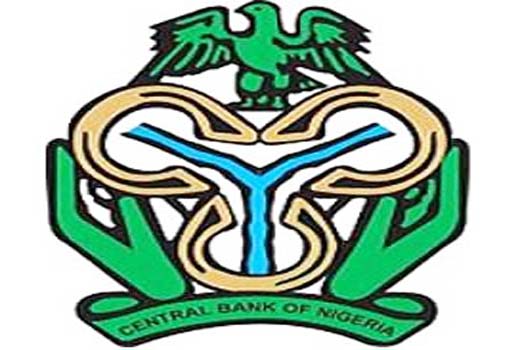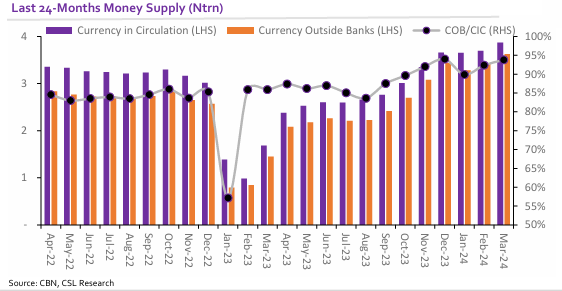Currency in Circulation Rises 130% Y-o-Y, Reaching an All-Time High of N3.87trn in March 2024

As of March 2024, the Central Bank of Nigeria (CBN) statistics revealed significant changes in the country’s money supply. Currency in circulation (CIC) rose by 130%, reaching N3.87trn in March 2024, up from N1.68trn in March 2023.
Month-on-month (M-o-M), CIC rose by 4.76%, setting a historical high of N3.87trn, surpassing the previous peak of N3.69trn in February 2024. Similarly, currency outside banks (COB) grew by 151%, to N3.63trn in March 2024, compared to N1.45trn in March 2023. This indicates that 93.75% of the CIC was outside the banking system as of March 2024, a significant increase from 57.14% in January 2023, following a few months of implementing the CBN’s Naira redesign program. Historically, COB has averaged about 84.5% of the total CIC from 1960 to March 2024, contributing to the weak pass-through of monetary policy to macroeconomic indicators like inflation.
The Naira redesign program initially appeared moderately successful in reducing currency outside banks, as evidenced by a considerable decrease in COB during the first four months of its implementation. However, between January and December 2023, CIC grew by 129.84% (N2.19trn) due to printing new currency and reintroducing previously withdrawn old Naira notes. During the same period, COB grew by 150.96% (N2.18trn), driven by increasing non-bank-held cash, especially among wealthy individuals, amid growing public concerns about the sufficiency of currency in the banking system.
The longstanding issue of a significant amount of currency circulating outside the banking system has been a persistent problem in Nigeria’s history. However, the recent surge to new highs is particularly worrisome.

Reducing cash outside the banking system is crucial to enhancing the effectiveness of monetary policy, promoting financial inclusion, and combating illicit activities such as terrorism and money laundering. This need is especially urgent in periods like the present when the Central Bank of Nigeria (CBN) is relying heavily on monetary policy to curb high inflation and stabilise a depreciating currency. Addressing these challenges can help the financial system contribute to broader economic stability and security objectives
5




